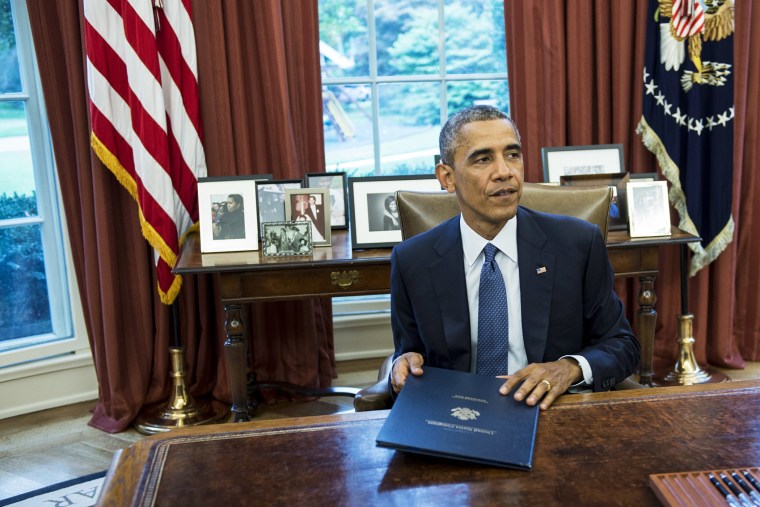The United States tortured, President Barack Obama told reporters last week.
"When we engaged in some of these enhanced interrogation techniques, techniques that I believe and I think any fair-minded person would believe were torture, we crossed a line," Obama said. "And that needs to be -- that needs to be understood and accepted. And we have to, as a country, take responsibility for that so that, hopefully, we don't do it again in the future."
The president’s remarks came shortly after the public learned that John Brennan, the director of the Central Intelligence Agency, apologized to the Senate Intelligence Committee, admitting that the CIA spied on the Senate committee staffers investigating the George W. Bush-era torture program.
Months earlier, Brennan had vowed no such thing had occurred. CIA officials were concerned that the Senate staff had obtained internal CIA documents coming to the same conclusions as a yet-to-be released Senate report on torture – that it was both brutal and ineffective – thus undermining the agency’s defense of their actions. A CIA Inspector General’s report found that the CIA had gained “improper” access to the Senate’s computers, and that the CIA’s counteraccusation, that it had been hacked by Senate staff, was based on “inaccurate information.” Brennan has assigned an “accountability board” to examine the matter and decide what changes or sanctions are appropriate.
Obama defended Brennan Friday and insisted that the U.S. was "taking responsibility" for torture in the same breath. "I have full confidence in John Brennan," Obama said.
So far, three senators, Democrats Mark Udall and Martin Henrich, and Republican Rand Paul, have called for Brennan to resign. Civil liberties groups are not weighing in on whether Brennan should stay or go, but some have long perceived a gap between the Obama administration's accountability rhetoric on torture and its actions.
“The president is absolutely right that there has to be responsibility for torture. That responsibility includes an obligation to investigate and prosecute torture, an obligation imposed by the U.N. Convention Against Torture," said Hina Shamsi, head of the American Civil Liberties Union's National Security Project. "So far, though, the record we have is one of near-total impunity, and not of responsibility.”
That assessment is years in the making. Coming into office, among Obama's first actions was shutting down the Bush-era "black sites" and confining U.S. government personnel to interrogation techniques in the U.S. Army Field Manual -- decisions that could be reversed by a future president. Obama also released Bush-era legal documents justifying the use of coercive interrogation. The president himself has publicly repudiated the use of torture many times.
"Accountability," however, has been elusive. From the beginning, Obama himself ruled out investigations into interrogators who had followed the Bush Justice Department's legal advice about which torture techniques were permissible.
A Justice Department inquiry into interrogators who went beyond the "legal" torture limits outlined by the Bush administration ended with no prosecutions. The Obama administration has blocked lawsuits from detainees who alleged they were tortured through state secrecy and immunity doctrines. An internal Justice Department ethics review of the attorneys who gave legal cover to "enhanced interrogation" was watered down by a top Justice Department official, overruling the finding that they had engaged in misconduct. Jose Rodriguez, the CIA official who acknowledged destroying video recordings of the torture of detainee Abu Zubaydah that a federal court ordered preserved, has gone on to mock the administration's opposition to torture while promoting his memoir. Brennan himself was reportedly a supporter of the Bush-era interrogation program, and, like other CIA officials who were involved, has simply moved up in the agency.
"The president has taken a 'let's look forward, not backward' approach to this issue, that is not sufficient, we're talking about torture," said Raha Wala, an attorney with Human Rights First.
Obama at least partially addressed this discrepancy during last week's press conference. "There was enormous pressure on our law enforcement and our national security teams to try to deal with this," Obama said of the time following the 9/11 terrorist attacks, in which Al Qaeda killed nearly 3,000 Americans. "And it’s important for us not to feel too sanctimonious in retrospect about the tough job that those folks had. And a lot of those folks were working hard under enormous pressure and are real patriots."
Civil liberties and human rights groups are hoping that the Senate investigation into Bush-era torture will open the window for Congress to act to prevent so-called "enhanced interrogation" techniques from being used again, if not reopening the door to possible criminal prosecutions. The report came back so heavily censored by the administration that Senate Intelligence Committee Chair Dianne Feinstein announced that the committee would be reviewing the redactions.
"The facts of the report, to the extent they establish criminality, ought to be a basis for the Obama administration to look into whether prosecutions are possible," said Wala. "But the bigger picture question is, what is the president and congress going to do to make sure this never happens again?"
